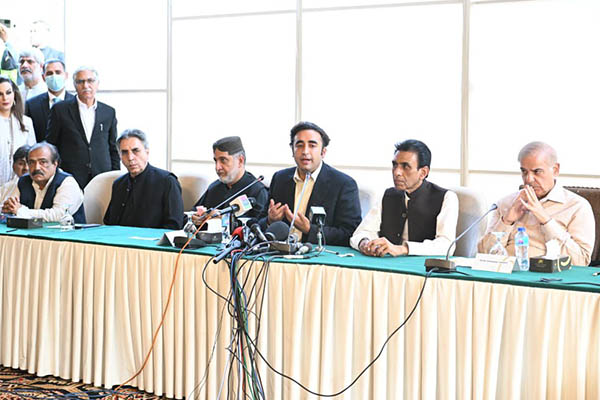
Photo courtesy PPP Media Cell
In joint press conference with opposition, former ruling coalition partner says it is supporting opposition for the welfare of areas that need attention
The Muttahida Qaumi Movement-Pakistan (MQM-P) on Wednesday formally declared its support for the united opposition’s no-confidence motion against Prime Minister Imran Khan, as its lawmakers resigned from the federal cabinet and entered into a “working relationship” with the Pakistan Peoples Party in Sindh.
The MQM-P’s decision effectively ends the prime minister’s majority in the National Assembly, leaving the ruling coalition with just 164 MNAs of the 172 it needs to form a government. By contrast, the opposition now boasts the support of 177 MNAs, a number that does not include the dissident members of the PTI that have expressed a desire to vote against their party leader during the no-trust motion.
“History is witness to the fact that we have decided to go along with you [opposition] in this working relationship not because of individual or party interests, but for the [welfare of the] areas we represent and which need attention,” MQM-P Convener Khalid Maqbool Siddiqui told a press conference alongside the leaders of all main opposition parties. “I hope this marks the start of an era where political differences are not seen as personal animosity, where political revenge does not exist, and where politicians start to tolerate each other’s views,” he added.
“Today, we are gathered here to vow that we would work beyond promises and ensure that the decisions we take impact common Pakistanis,” he stressed, as he invited Leader of the Opposition in the National Assembly Shahbaz Sharif to address the press.
“This is an historic day for Pakistan,” said Sharif, who is also the president of the Pakistan Muslim League (Nawaz). “After decades, the opposition has united on a single platform,” he said, and thanked the MQM-P and its workers joining the opposition and strengthening the united front against the incumbent government. “I especially want to thank [PPP Chairman] Bilawal Bhutto-Zardari and [PPP Co-chairman Asif Ali] Zardari for their open-mindedness on this new journey for Pakistan’s prosperity,” he added.
“This agreement [between the PPP and MQM-P] will be implemented in letter and spirit,” he vowed, and urged the prime minister to resign, as he no longer enjoyed the support of the majority of the Lower House. “Tradition and democratic practices require a prime minister to resign if he loses the support of the majority of the House,” he said. “I don’t have much expectations of the P.M., but I hope that he will resign willingly rather than waiting on the result of the vote of no-confidence,” he said, adding that this would “set a new precedent in Pakistan’s political history.”
Addressing media, PPP’s Bilawal Bhutto-Zardari thanked the MQM-P and also described its decision of joining the opposition as “historic.” Emphasizing that the PPP and MQM-P’s “working relationship” was not related to the no-confidence motion, he said they would work together to ensure Karachi and Pakistan’s prosperity. “During the Senate elections, I had proposed that they work with us … and today we have finally come to a point where we can start working together,” he said, and reiterated his accusations of the general elections of 2018 being a “conspiracy” that “selected” Imran Khan as prime minister rather than “electing” him. “He [Khan] has no option left,” he said. “He can either resign or get dismissed via no-confidence,” he said, and called for the NA speaker to allow voting on the no-confidence motion tomorrow (March 31).
Jamiat Ulema-e-Islam (Fazl) chief Maulana Fazlur Rehman, who is also the president of the united opposition’s Pakistan Democratic Movement, welcomed the MQM-P’s decision. “This decision is an expression of national unity for not only Karachi and Sindh but the whole of Pakistan,” he said, adding that this meant the opposition now had 176 members in the National Assembly, even though it only needed 172 to oust Imran Khan.
The MQM-P’s Siddiqui especially noted the role of the Balochistan National Party-Mengal, and the Balochistan Awami Party in the united opposition, stressing that he hoped this would lead to a resolution and end of the practice of “missing persons.” Addressing media, BNP-M’s Akhtar Mengal said the opposition did not want a “naya Pakistan,” but rather it wanted a Pakistan where there would be no more missing persons, where rule of law would be ensured, and where elections would be free and fair.
The press conference concluded with a symbolic signing of the agreement pledged between the MQM-P and the united opposition.
During a subsequent question-and-answer session, Sharif said the opposition’s sole desire was to work for the welfare of Pakistan’s 220 million people. To another question, Bilawal said the joint opposition would work together to determine when to call the next elections.
Earlier, the MQM-P’s coordination committee had announced that it had ratified the agreement between the party and the opposition on the no-confidence motion against the prime minister. MQM-P leaders Farogh Naseem and Aminul Haque also resigned from the federal cabinet, saying they were acting on the orders of their party chief.
